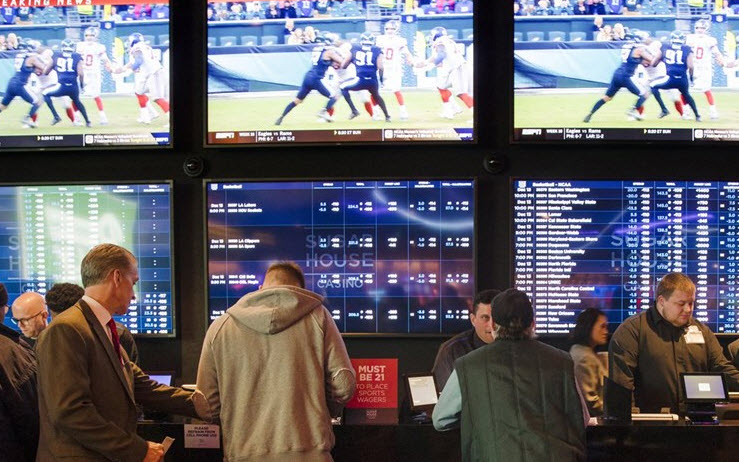The state of Wisconsin has seen quite a lot of political activity in the recent 48 hours as one of the house representatives Tyler Vorpagel has made arguments that it might be better for the state to legalize sports betting.
This may be a very simple sentence to say, but it is definitely a much harder feat to achieve, especially in the not so gambling-friendly nature of Wisconsin and most states around it. However, it is a fact that sports betting is almost unstoppable especially when there are major events such as the NFL season or the Super Bowl happening in the country.
This forces citizens of states where betting is banned, to re-locate for a while in order to place bets in neighboring states. For Wisconsin, that state is Iowa, where tens of thousands of gambling lovers move to, in order to place bets on their favorite teams.
It may have been the perfect time for Vorpagel to push this bill in the house of representatives, as we’re in the second week of the 2019 NFL season. This event has already encouraged betting lovers to re-locate to Iowa for bets, potentially moving millions of dollars away from the state.
What is the campaign based on?
The campaign is solely based on local economies. Vorpagel argues that instead of losing this money to neighboring states, it’s much better to allow betting locally.
There is some merit to the representative’s argument, as almost every attempt to mitigate gambling issues across the whole country has been for naught. In fact, one of the biggest critics of this bill Rose Blozinski, the executive director of the Wisconsin Council of Problem Gambling, has mentioned that the annual number of calls the council receives has quadrupled over the last 25 years.
This argument may have been used as a counter to Vorpagel’s bill, but in reality, it just strengthens the motion even further.
The fact that a council for problem gambling exists in a state where it’s illegal (besides the land casinos owned by tribes) but still has increasing cases occurring is proof that the current strategy is not working.
Therefore, why not direct the funds being funneled outside of the state into either state-owned betting companies, or a privatized local sector while a new strategy is developed? The funds gained from taxing these gambling activities can later be used to combat problem gambling.
State-owned or privatized?
The next question that rises up is whether or not these enterprises should be state-owned if they are legalized.
The argument for these would be that the state will have much better capabilities of regulating problem gambling should they have hands-on control of the industry within their state. Things like a cap on bets and no minimum requirements are the first things that spring to mind.
However, we all know that competition and customer service quality is what drives an industry to be beneficial for a local economy. Restricting it within the ramifications of the law, and pretty much monopolizing it within the government’s grasp is not likely to produce any additional benefit. In fact, it could quite likely harm the overall economy as funds would be required to funnel into these ventures.
We already have a very good example of a state-owned and operated betting industry. However, it’s not necessarily in the US market, therefore, the understanding and the implications could be much different.
The example that’s being referred to in Norway. The country does indeed have betting, lottery, even gambling games legalized, but all owned and controlled by a state-commissioned entity.
This creates a non-customer friendly environment, where chances are winning are already next to none, while the return is nowhere near what’s available elsewhere.
This then forces interested citizens to locate external means of betting, which is usually done through several online Norwegian bookmakers that are registered elsewhere but cater to the local population.
Not only does this deprive the state-commissioned companies of income, but drains the local treasury from resources by trying to keep the enterprise alive.
Multiple politicians are constantly campaigning to privatize the industry but to no avail.
With an example like this, it should be obvious for lawmakers in Wisconsin that encompassing the industry in a state-run monopoly would bring much more hassle than it’s worth.
Will the bill pass?
The bill is yet to be drafted, but the lawmakers have quite a lot of time to make it before the 2020 NFL season that will be happening in a year.
Therefore they have a lot of time to campaign on this bill, garner support and spread awareness across the population.
In this case, it will be more important to garner support from house representatives, only after which it can boil down to the general population.
It’s likely that competition will be tough from those who oppose the bill. Arguments such as the increase in problem gambling are sure to arise, but as already mentioned there is a perfect counterargument of directing the projected profits to combat addiction.
Furthermore, there is always the risk of more and more states taking the same route towards legalizing sports betting. We’ve already seen states like Minnesota undertake this topic not too long ago and campaign on it quite successfully.
How will it look like?
It’s possibly going to take the following route.
Those who campaign for the bill will start garnering support from other representatives. Several senate meetings will be held to further simplify the bill in order to outline its general direction, as well as main goals.
It will most likely outline goals such as a better economic future for the state, as well as additional funds to bring problem gambling back within manageable proportions.
Once there has been enough campaigning, a referendum will likely take place, where both the house of representatives, and the population of Wisconsin will display their wishes by simply saying “Yes” or “No”.
Should there be overwhelming support for the bill, it will pass in around Q2 of 2020, and local entrepreneurs, as well as businessmen, will be encouraged to set up shop right away before the big NFL 2020 season.
But for now, it’s all about drafting the bill and building a comprehensive strategy to promote it.











